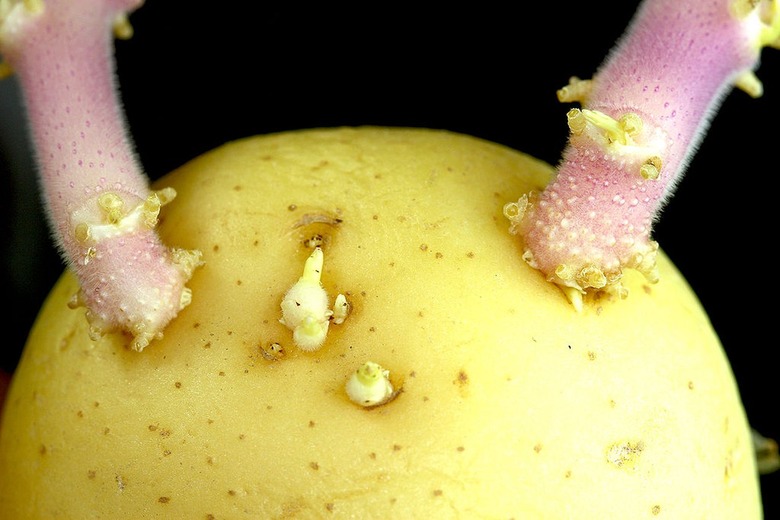It's Only Safe To Eat Sprouted Potatoes If You Do This
We may receive a commission on purchases made from links.
We've all gone to grab potatoes and have noticed strange sprouts growing off of them. And we've all asked ourselves the following question: Are sprouted potatoes still safe to eat or should I throw them out (even though no one wants to waste food)? We reached out to dietitians for the answer.
"Eat the potatoes — but first, cut out the sprouts ('the eyes') and green spots," Isabel Maples, a nutritionist and registered dietitian with the Academy of Nutrition and Dietetics, tells Hunker. "You should probably peel those potatoes, too, in part because the skin may taste bitter. And by the way, the vitamins and minerals are in the white part of a potato — not just in the skin."
According to registered dietitian Libby Mills, a national spokesperson for the Academy of Nutrition and Dietetics, sprouted potatoes are a concern because of the glycoalkaloids contained within them. "In small amounts, glycoalkaloids may have health benefits. But in excess, these compounds are toxic and can cause illness — even death if ingested in high amounts," she tells Hunker. "Luckily, the concentration of glycoalkaloids is low in the white part that we eat. The highest concentrations of these toxins are in the leaves, flowers, 'eyes', green skin, and sprouts." That's exactly why we should remove these parts before eating the potato.
Maples adds that solanine, a specific type of glycoalkaloid, has been known to cause issues in the past. "Especially during periods of food shortages, when one might be reluctant to throw out sprouting potatoes, there are stories of people getting sick — even dying — from a nerve toxin in sprouting potatoes," she says. This is not as much of a concern today because commercially grown potatoes are now screened for solanine.
When it comes to storing potatoes properly, registered dietitian Judy Barbe, author of Your 6-Week Guide to LiveBest, advises that potatoes are kept in a cool, dark, well-ventilated pantry to slow down greening and sprouting. A temperature of 45 to 50 degrees Fahrenheit would be best. "Temperatures higher than 50 degrees Fahrenheit encourage sprouting and shriveling; lower temperatures cause transformation of starch to sugar, which changes the taste and cooking properties," she says.
To prevent your potatoes from going to waste, Maples says, "Only buy the amount of potatoes that you will use in a short period of time." Also, don't put them in the fridge and don't store them near onions. "The onions release gasses that make the potatoes more likely to sprout. Potatoes that are stored with onions do not last as long," she explains.
So, in short, you can eat potatoes that have sprouted — just remove the sprouts first!
